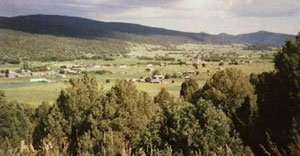Mora County is the first county in the US to ban all oil and gas extraction, hopefully starting a trend.
Located in Northern New Mexico, the Mora County Community Water Rights and Local Self-Government Ordinance establishes a local Bill of Rights that notably includes the right to clean air, water, a healthy environment and the rights of nature. It prohibits activities which would interfere with those rights, including oil drilling and hydraulic fracturing for shale gas.
The ordinance also asks the state to amend the Constitution so that it "elevates community rights above corporate property rights."
Mora Valley:

Over 150 communities in the US have adopted ordinances that assert their right to local self-governance by controlling corporate activities within their municipality, says the Community Environmental Legal Defense Fund (CELDF)
"Existing state and federal oil and gas laws force fracking and other extraction activities into communities, overriding concerns of residents," says Thomas Linzey, Esq., executive director of CELDF, which helped them draft the law. "Today’s vote in Mora County is a clear rejection of this structure of law which elevates corporate rights over community rights, which protects industry over people and the natural environment."
In 2010, Pittsburgh passed a similar bill of rights that bars fracking and establishes rights for community and nature as did Las Vegas last year. Towns in Pennsylvania, Ohio, Maryland, New York and New Mexico have enacted similar ordinances.
While communities have struggled for decades to block corporate assaults such as incinerators, factory farms, and big-box retailers, it’s a constant battle to fight off their well-funded legal pushbacks.
Only by asserting local, democratic control directly over corporations through local laws, can communities gain real control.
Impressively, communities are also opting for laws that change the status of natural communities and ecosystems from being regarded as property under the law to being recognized as rights-bearing entities.
"Today’s environmental laws place commerce above nature, and in so doing they legalize harm to ecosystems," says Shannon Biggs, Director of the Community Rights Program for Global Exchange.
Ecuador and Bolivia have both adopted laws that establish the rights of nature, but Ecuador seems to be re-negging on that.
Read our article, Wild Law: The New Jurisprudence.
Learn more about CELDF:
